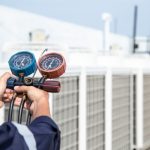
1. Regular HVAC System Maintenance:
One of the best ways to prevent unexpected HVAC issues is to schedule regular maintenance for your system. Regular maintenance ensures that your HVAC system is functioning at its best and helps identify and address potential problems before they escalate. By implementing a maintenance schedule and partnering with professional HVAC technicians, you can significantly reduce the risk of sudden system failures.
2. Develop a Contingency Plan:
In anticipation of unexpected HVAC issues, it’s crucial to develop a contingency plan that outlines the necessary steps to be taken in case of system failure. This plan should include contact information for reliable HVAC contractors who can provide immediate assistance, as well as a clear timeline for response and resolution. Having a contingency plan in place will save valuable time and enable swift action when HVAC emergencies occur.
3. Identify Temporary Cooling or Heating Solutions:
When facing HVAC system failures, it’s important to have temporary cooling or heating solutions readily available. This can include portable HVAC units, fans, or heaters that can be deployed to maintain a comfortable indoor environment while the main system is being fixed. Identifying and procuring these temporary solutions in advance will help ensure minimal disruption to daily operations and employee productivity.
4. Communication Strategy:
A clear and efficient communication strategy is essential when unexpected HVAC issues arise. Ensure that all employees are aware of who to contact in case of system failures, whether it’s the designated HVAC contractor or a designated internal point of contact. Establishing a communication chain and providing clear instructions for reporting HVAC issues will facilitate quick response times and an organized approach to resolving the problem.
5. Employee Training and Awareness:
Training your employees on basic HVAC troubleshooting procedures can go a long way in expediting the process of identifying and solving minor system issues. Provide employees with basic knowledge of HVAC systems, such as how to evaluate thermostat settings, check for tripped circuit breakers, or identify common warning signs of system failures. This will empower employees to take immediate action and potentially resolve minor problems without the need for professional assistance.
6. Document Emergency Procedures:
Documenting emergency procedures related to HVAC system failures ensures that everyone in your organization is aware of the necessary steps to take in such situations. This documentation should include a step-by-step protocol for reporting issues, contacting the HVAC contractor, and implementing temporary solutions. Regularly review and update these procedures to reflect any changes in personnel or the HVAC system itself.
7. Maintain Vendor Relationships:
Building and maintaining good relationships with HVAC contractors is crucial for efficient emergency response. Establishing ongoing partnerships with reliable vendors ensures they are familiar with your business and its HVAC infrastructure. Regularly communicate your business needs, provide any relevant updates on the system, and inquire about emergency response protocols. These relationships will expedite response times when HVAC emergencies occur.
8. Backup Power Systems:
In certain cases, unexpected HVAC issues may be a result of power outages. To minimize the impact of power failures on your HVAC system, consider installing backup power systems such as generators or uninterruptible power supplies (UPS). These systems can provide temporary power to essential HVAC components, ensuring that your business can continue operating even during electrical interruptions.
Summary:
Being prepared for unexpected HVAC issues is essential for maintaining business continuity. By implementing a regular maintenance schedule, developing a contingency plan, identifying temporary cooling or heating solutions, establishing a clear communication strategy, providing employee training, documenting emergency procedures, maintaining vendor relationships, and considering backup power systems, you can effectively handle unexpected HVAC issues and minimize disruption to your business. Remember, proactive planning and preparedness will help your business recover quickly and continue to operate successfully.
Need HVAC Services in Wilmington, DE?
Since 1984, Commercial Equipment Service Inc. has been providing service and sales of commercial/restaurant cooling, refrigeration and heating equipment to Wilmington, Delaware and the surrounding area. We are a locally owned business with over 42 years of experience. Our friendly staff prides itself on our professional attitude and service. Commercial Equipment Service Inc. is a 24/7 on-call service for your appliance needs! We install and repair all refrigeration and cooking equipment, heating and air conditioning, emergency generator sales, kitchen exhaust systems, beverage systems and so much more. Contact us today to learn more about what we can do for you!
